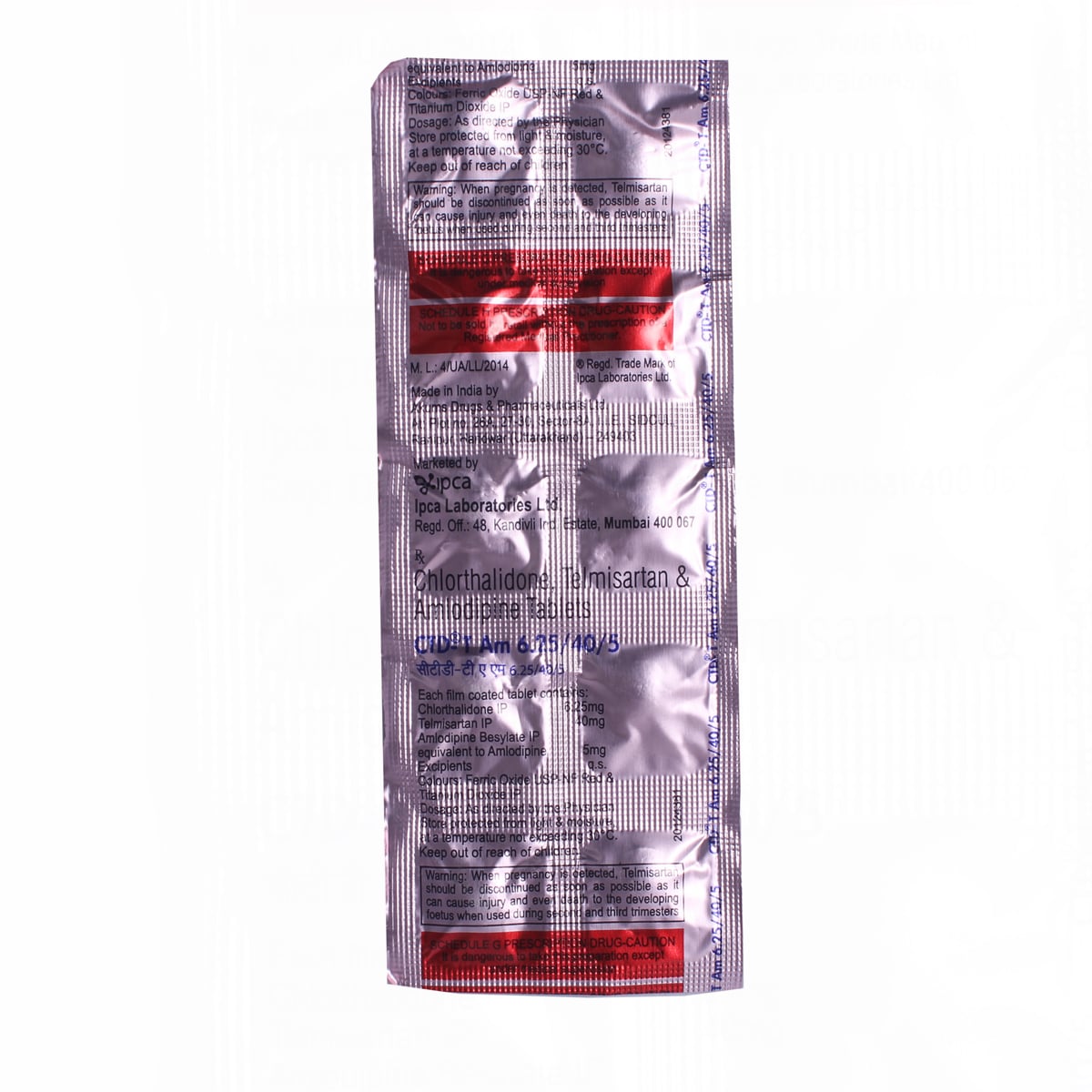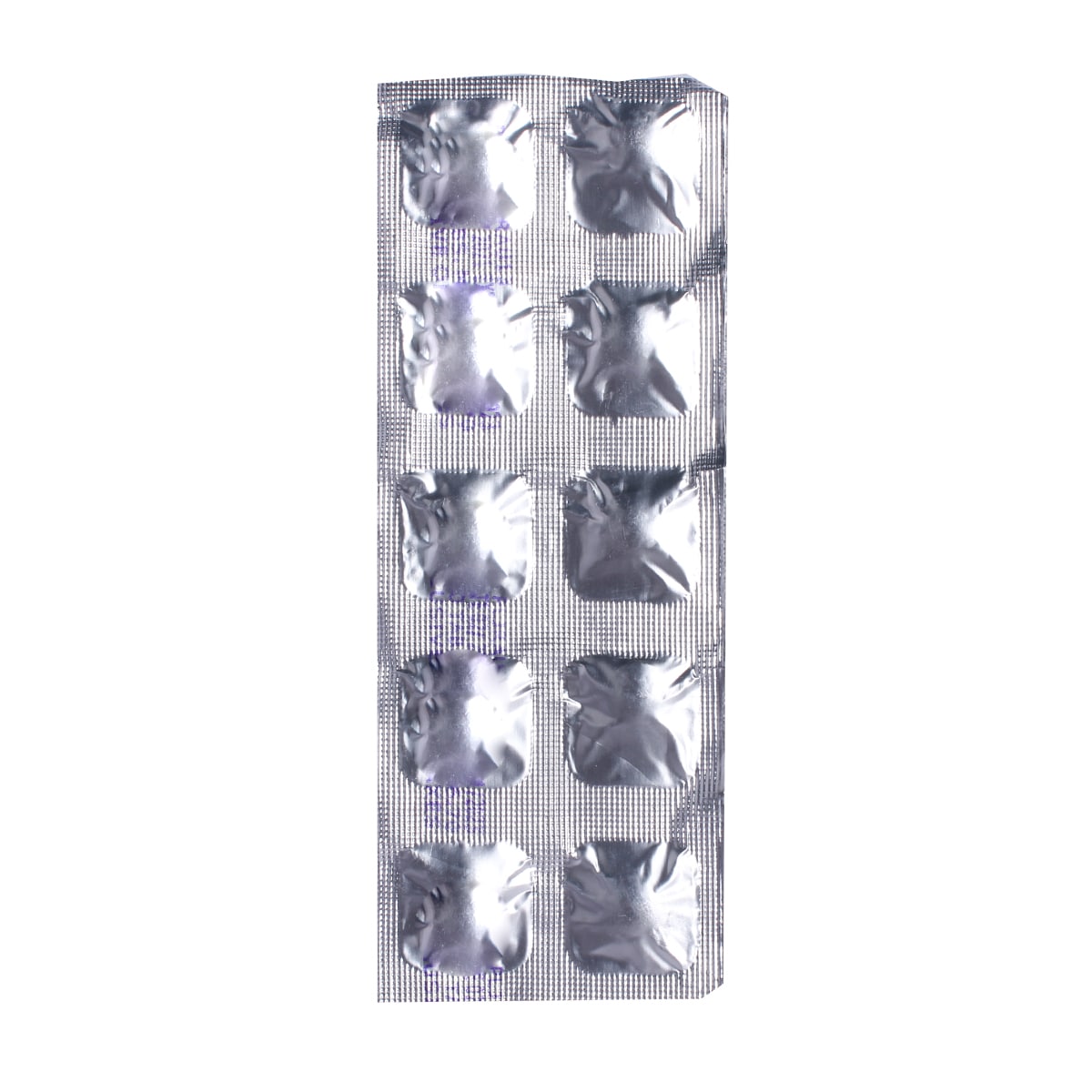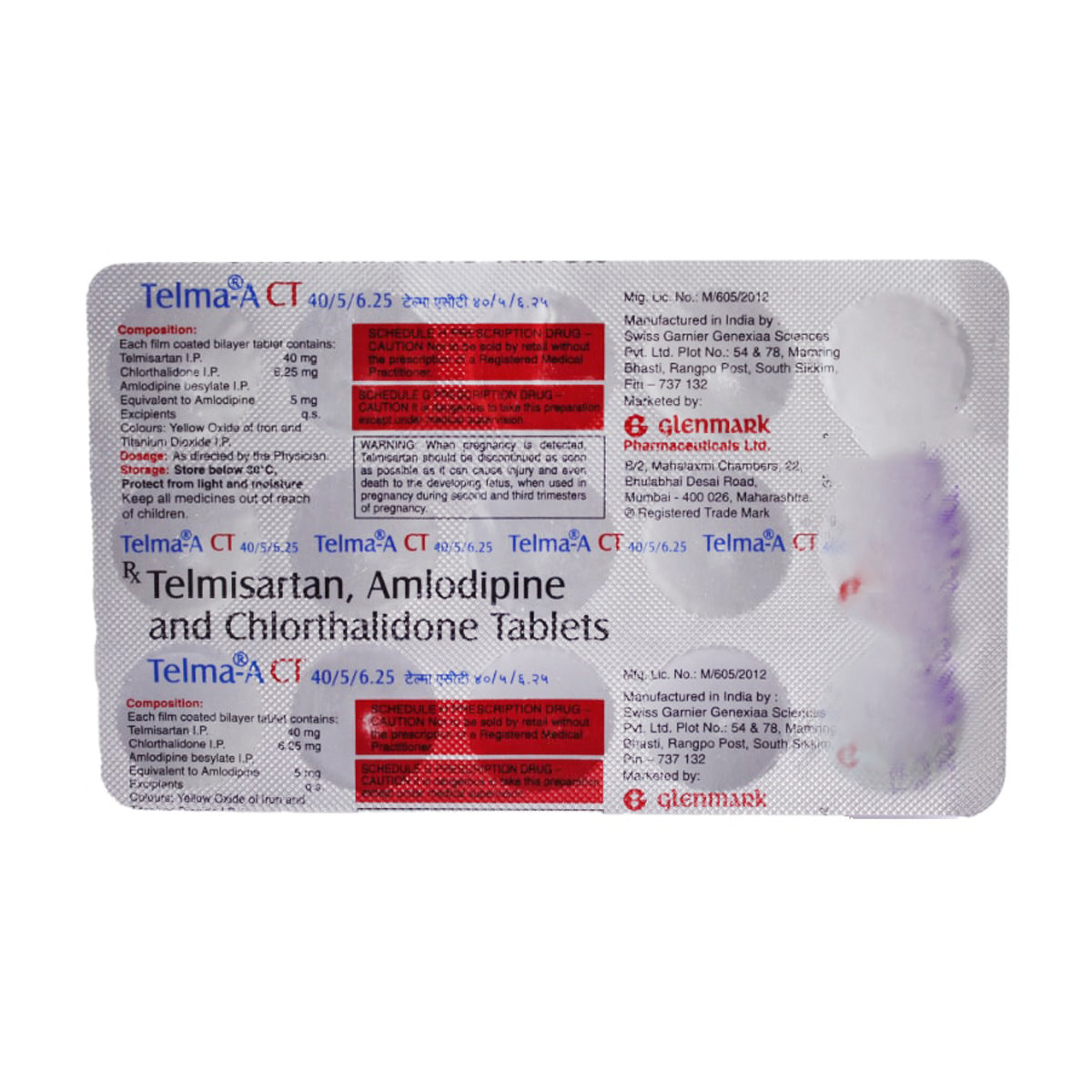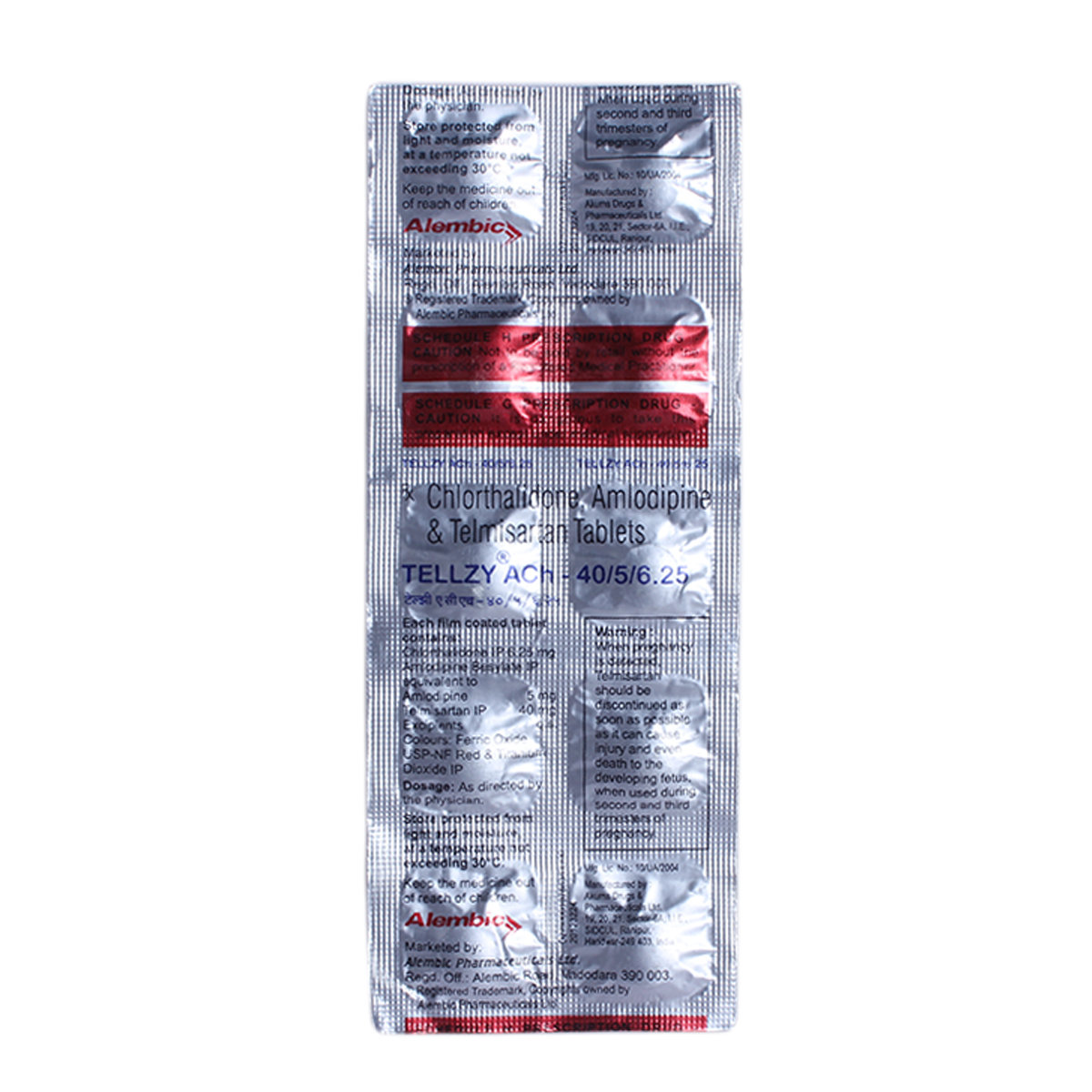CTD-T AM 6.25/40/5 Tablet 10's
MRP ₹159.5
(Inclusive of all Taxes)
₹23.9 Cashback (15%)
Provide Delivery Location
Online payment accepted
 Prescription drug
Prescription drugWhats That
Manufacturer/Marketer :
Consume Type :
Expires on or after :
Return Policy :
About CTD-T AM 6.25/40/5 Tablet
CTD-T AM 6.25/40/5 Tablet belongs to the anti-hypertensive drugs class, primarily used to treat high blood pressure (hypertension). Hypertension is a medical condition in which blood pressure is elevated persistently in the arteries. It is considered an essential risk factor for cardiovascular diseases.
CTD-T AM 6.25/40/5 Tablet consists of three anti-hypertensive medicines, namely: Amlodipine, Chlorthalidone, and Telmisartan. Amlodipine belongs to the class of calcium channel blockers. It is a vasodilator that dilates (widens) blood vessels and increases blood flow, further improving the oxygen delivery to the heart tissue. Chlorthalidone belongs to the class of diuretics (water pill) with antihypertensive activity. It inhibits sodium and chloride reabsorption from absorbing excess salts that cause fluid retention or build-up. Chlorthalidone lowers blood pressure by decreasing the amount of blood the heart pumps (cardiac output) and reducing plasma and extracellular fluid volume (body fluids outside the cells). Telmisartan belongs to a group of drugs called angiotensin II receptor antagonists (angiotensin is a hormone that constricts blood vessels and increases blood pressure). It lowers blood pressure and increases blood flow by preventing the narrowing of blood vessels.
In some cases, CTD-T AM 6.25/40/5 Tablet can cause side effects like sleepiness, taste changes, ankle swelling, headache, flushing (feeling warmth in the face, ears, neck, and trunk), dizziness, tiredness, palpitations (irregular heartbeat), and upset stomach. Most of these side effects of CTD-T AM 6.25/40/5 Tablet do not require medical attention and gradually resolve over time. However, if these side effects persist longer, please consult your doctor.
If you are known to be allergic to CTD-T AM 6.25/40/5 Tablet or any other medicines, please inform your doctor. Before taking CTD-T AM 6.25/40/5 Tablet , let your doctor know if you have any heart, kidney, or liver problems, diabetes, electrolyte imbalance, and dehydration. Avoid potassium supplements with CTD-T AM 6.25/40/5 Tablet as it may lead to high potassium levels in the blood. Pregnant or breastfeeding women should also consult their doctor before taking CTD-T AM 6.25/40/5 Tablet . It is advised to complete the prescribed course, even if you feel better. Please do not stop taking CTD-T AM 6.25/40/5 Tablet on your own, as it may lead to the recurrence of symptoms or worsen the disease. Do not consume alcohol with CTD-T AM 6.25/40/5 Tablet as it may increase the risk of low blood pressure.
Uses of CTD-T AM 6.25/40/5 Tablet
Directions for Use
Key Benefits
CTD-T AM 6.25/40/5 Tablet is an anti-hypertensive drug that treats high blood pressure (hypertension). It contains Amlodipine, Chlorthalidone, and Telmisartan. Amlodipine is a calcium channel blocker that dilates (widens) blood vessels and increases blood flow. It is used to treat high blood pressure, chest pain (angina), and other conditions caused by coronary artery disease. Chlorthalidone is a diuretic (water pill). It prevents the body from absorbing excess salts that cause fluid retention or build-up. It effectively treats high blood pressure, fluid retention in patients with congestive heart failure, cirrhosis (chronic damage) of the liver, kidney disorders, or edema caused by steroids or estrogen therapy. Telmisartan is an angiotensin II receptor antagonist (angiotensin is a hormone that constricts blood vessels and increases blood pressure). It lowers blood pressure and increases blood flow by preventing the narrowing of blood vessels. It reduces the risk of stroke, heart attack, or death from heart problems.
Storage
Drug Warnings
Monitor your blood pressure levels regularly. If you are known to be allergic to CTD-T AM 6.25/40/5 Tablet or have any kidney or liver problems or severe dehydration, please inform your doctor beforehand. Brief your medical history if you have low blood pressure, diabetes, gout, lupus (immune system disorder), hyperkalemia (high potassium levels), heart diseases (aortic stenosis, heart failure), angioedema (swelling of the lower layer of skin and tissue), anuria (low or no urine output), and asthma before starting CTD-T AM 6.25/40/5 Tablet . Avoid potassium supplements with CTD-T AM 6.25/40/5 Tablet as it may lead to high potassium levels in the blood. Too much sweating, diarrhea, or vomiting while using CTD-T AM 6.25/40/5 Tablet may lead to dehydration; hence it is advised to drink enough fluids. CTD-T AM 6.25/40/5 Tablet can affect and harm the developing baby during pregnancy. Consult your doctor before using CTD-T AM 6.25/40/5 Tablet if you are a pregnant or breastfeeding mother. Complete the course strictly as suggested by the doctor, even if you feel better, to avoid disease recurrence. Avoid consumption of alcohol with CTD-T AM 6.25/40/5 Tablet as it may increase the risk of low blood pressure. Safety and effectiveness of CTD-T AM 6.25/40/5 Tablet in pediatric patients have not been established.
Drug-Drug Interactions
Drug-Drug Interactions
Login/Sign Up
Using CTD-T AM 6.25/40/5 Tablet together with dantrolene may increase the risk of hyperkalemia (high blood potassium).
How to manage the interaction:
Taking CTD-T AM 6.25/40/5 Tablet with Dantrolene can cause an interaction, consult a doctor before taking it. You should seek medical attention if you experience nausea, vomiting, weakness, confusion, tingling of the hands and feet, a weak pulse, or a slow or irregular heartbeat. Do not stop using any medications without talking to a doctor.
Co-administration of Aliskiren with CTD-T AM 6.25/40/5 Tablet can increase the risk of hyperkalemia (high potassium levels in the blood).
How to manage the interaction:
Taking CTD-T AM 6.25/40/5 Tablet with Aliskiren can possibly lead to an interaction, please consult a doctor before taking it. Do not discontinue the medications without consulting a doctor.
Co-administration of CTD-T AM 6.25/40/5 Tablet and cisapride may increase the risk or severity of an irregular heart rhythm that may be serious.
How to manage the interaction:
Taking CTD-T AM 6.25/40/5 Tablet with Cisapride is not recommended, please consult your doctor before taking it. Do not discontinue the medication without consulting a doctor.
Using CTD-T AM 6.25/40/5 Tablet and mitotane together may drastically lower CTD-T AM 6.25/40/5 Tablet blood levels, which makes the medicine less effective.
How to manage the interaction:
Although co-administration of CTD-T AM 6.25/40/5 Tablet with mitotane can result in an interaction, it can be taken if a doctor has advised it. Do not discontinue any medications without consulting a doctor.
Using phenobarbital and CTD-T AM 6.25/40/5 Tablet may drastically lower CTD-T AM 6.25/40/5 Tablet blood levels, which makes the medicine less effective.
How to manage the interaction:
Although co-administration of phenobarbital with CTD-T AM 6.25/40/5 Tablet can result in an interaction, it can be taken if a doctor has advised it. Do not discontinue any medications without consulting a doctor.
Coadministration of CTD-T AM 6.25/40/5 Tablet and carbamazepine together may significantly reduce CTD-T AM 6.25/40/5 Tablet blood levels, making the medicine less effective.
How to manage the interaction:
Although there is an interaction between CTD-T AM 6.25/40/5 Tablet with carbamazepine, it can be taken if a doctor has advised it. However, if you experience any unusual symptoms contact the doctor immediately. Do not stop using any medications without talking to a doctor.
Using CTD-T AM 6.25/40/5 Tablet and phenytoin together may drastically lower CTD-T AM 6.25/40/5 Tablet blood levels, which makes the medicine less effective.
How to manage the interaction:
Although CTD-T AM 6.25/40/5 Tablet with phenytoin can result in an interaction, it can be taken if a doctor has advised it. Do not discontinue any medications without consulting a doctor.
Using CTD-T AM 6.25/40/5 Tablet and primidone together may lower CTD-T AM 6.25/40/5 Tablet blood levels, which makes the medicine less effective.
How to manage the interaction:
Although co-administration of CTD-T AM 6.25/40/5 Tablet with primidone can result in an interaction, it can be taken if a doctor has advised it. Do not discontinue any medications without consulting a doctor.
Coadministration of lemborexant and CTD-T AM 6.25/40/5 Tablet may increase the blood levels of lemborexant.
How to manage the interaction:
Although co-administration of CTD-T AM 6.25/40/5 Tablet with Lemborexant can result in an interaction, it can be taken if a doctor has advised it. However, consult your doctor if you experience abnormal sleep patterns, worsening of depression, changes in heartbeat, or headache. Do not discontinue any medications without consulting a doctor.
Taking simvastatin with CTD-T AM 6.25/40/5 Tablet may result in considerably higher blood levels of simvastatin and may increase the risk of side effects (liver damage and rhabdomyolysis - an uncommon but serious illness characterized by the breakdown of skeletal muscle tissue).
How to manage the interaction:
Although taking CTD-T AM 6.25/40/5 Tablet with simvastatin can result in an interaction, it can be taken if a doctor has advised it. If you have unexplained muscular pain, soreness, or weakness while using simvastatin, especially if these symptoms are accompanied by fever or dark-colored urine, consult the doctor immediately. However, if you develop a fever, chills, joint pain or swelling, unusual bleeding or bruising, skin rash, itching, loss of appetite, fatigue, nausea, vomiting, dark colored urine, and/or yellowing of the skin or eyes, consult the doctor. Do not stop using any medications without a doctor's advice.
Drug-Food Interactions
Drug-Food Interactions
Login/Sign Up
Lentils, Orange Juice, Oranges, Raisins, Potatoes, Salmon Dried, Spinach, Tomatoes, Sweet Potatoes, Coconut Water, Beans, Beetroot, Broccoli, Bananas, Apricots, Avocado, Yogurt
How to manage the interaction:
Taking potassium rich food while on the treatment with Amlodipine, chlorthalidone and telmisartan can increase the levels of potassium salt in blood which lead to experience nausea, vomiting, weakness, confusion, tingling in hands or feet, feeling of heaviness in the legs, or slow or rapid heartbeat. Avoid or limit taking potassium rich food while on the treatment with Amlodipine, chlorthalidone and telmisartan
Diet & Lifestyle Advise
- Reduce sodium intake in your diet to maintain your blood pressure.
- Eat natural and healthy foods by cutting down on high on sodium processed foods.
- Lose those extra pounds since being obese can be a risk factor for hypertension.
- Exercise regularly to maintain good heart health.
- Avoid smoking and alcohol intake.
- Chronic stress may also cause high blood pressure. Therefore, avoid stress triggers and make time for yourself to relax and do activities that you enjoy.
- Try to include heart-healthy omega-3 fatty acids-containing food drinks in your daily diet. You can also use low-fat cooking oil like olive oil, soybean oil, canola oil, and coconut oil to lower your elevated blood pressure.
- Limit sodium chloride intake (table salt) in your daily diet to 2300 mg per day or less than 1500 mg is ideal for most adults.
Side Effects of CTD-T AM 6.25/40/5 Tablet
- Sleepiness
- Taste changes
- Ankle swelling
- Headache
- Flushing (feeling warmth in the face, ears, neck, and trunk)
- Dizziness
- Tiredness
- Palpitations (irregular heartbeat)
- Altered blood glucose levels
- Upset stomach
Habit Forming
Therapeutic Class
All Substitutes & Brand Comparisons
RX
Telmized Trio-40/5/6.25 Tablet 10's
Amizade Pharmaceuticals
₹80
(₹7.2 per unit)
49% CHEAPERRX
Telx 3D 40/5/6.25 Tablet 15's
Alteus Biogenics Pvt Ltd
₹127.5
(₹7.65 per unit)
46% CHEAPERRX
Aztel Trio 6.25 Tablet 15's
Azkka Pharmaceuticals Pvt Ltd
₹132
(₹7.92 per unit)
44% CHEAPER
Author Details
We provide you with authentic, trustworthy and relevant information
Drug-Diseases Interactions
Drug-Diseases Interactions
Login/Sign Up
FAQs
Drug-Drug Interactions Checker List
- NEBIVOLOL
- METOPROLOL
- ALISKIREN
- RAMIPRIL
- BENAZEPRIL
- LISINOPRIL
- DULOXETINE
- INSULIN GLARGINE
- ERGOCALCIFEROL
- CHOLECALCIFEROL
- ASPIRIN
- NAPROXEN
- IBUPROFEN
- APIXABAN
- ATORVASTATIN
- PREGABALIN
- LITHIUM
- CISAPRIDE
- DOFETILIDE
- DROSPIRENONE
Special Advise
- Keep a check on your daily blood pressure, and if you notice any fluctuations, please consult a doctor.
- Your doctor may ask you to undergo blood and urine tests if you have been suffering from vomiting or dehydration.
- If you have diabetes, using CTD-T AM 6.25/40/5 Tablet may affect your blood sugar levels. Inform your doctor so that your diabetes medication may be adjusted accordingly.
- Your dietician may prescribe you a suitable exercise program and diet to manage your blood pressure.
- Thiazide diuretics like Chlorthalidone may increase serum triglyceride and cholesterol levels. Hence it is advised to monitor your cholesterol levels regularly.
- Therapy with CTD-T AM 6.25/40/5 Tablet should be discontinued if you have been suggested tests for parathyroid function in cases like hyperparathyroidism (excessive parathyroid hormone levels).
Disease/Condition Glossary
Hypertension is a medical condition in which blood pressure is elevated persistently in the arteries. It is considered an essential risk factor for cardiovascular diseases and can be caused due to obesity, diabetes, smoking, high salt intake, stress, lack of physical activity, or ageing. Blood pressure is measured in the ratio of systolic pressure to diastolic pressure. Systolic pressure is the pressure when the heart pumps blood out. On the other hand, diastolic pressure is the pressure when your heart is at the resting stage between heartbeats. If your blood pressure is 140/90 mm of Hg, it means the systolic pressure is 140 mm of Hg and, diastolic pressure is 90 mm of Hg. The ideal blood pressure range lies in between 90/60 mmHg and 120/80 mmHg. If the blood pressure is 140/90 mmHg or greater, it is considered high blood pressure.

Have a query?
Alcohol
Safe if prescribed
It is unsafe to consume alcohol since alcohol consumption with CTD-T AM 6.25/40/5 Tablet may increase the risk of low blood pressure and cause adverse effects, such as dizziness, fainting, light-headedness, or headache.
Pregnancy
Consult your doctor
CTD-T AM 6.25/40/5 Tablet is not recommended and unsafe in pregnancy. It can affect and harm the developing baby. Consult your doctor before taking CTD-T AM 6.25/40/5 Tablet if you plan to become pregnant or already pregnant. Your doctor will weigh the potential risks and benefits before prescribing CTD-T AM 6.25/40/5 Tablet .
Breast Feeding
Consult your doctor
There is no evidence on how CTD-T AM 6.25/40/5 Tablet affects breastfeeding. Please consult your doctor before taking CTD-T AM 6.25/40/5 Tablet if you are breastfeeding.
Driving
Safe if prescribed
CTD-T AM 6.25/40/5 Tablet may cause side effects like dizziness, headaches, nausea, or tiredness, which can affect your ability to concentrate and drive. Hence, it is recommended not to drive or operate machinery until you are mentally alert.
Liver
Consult your doctor
Let your doctor know if you have any history of liver diseases before taking CTD-T AM 6.25/40/5 Tablet . The dosage will be initiated in lower doses and will be further increased in patients with liver diseases. However, CTD-T AM 6.25/40/5 Tablet is not recommended in patients with severe hepatic impairment.
Kidney
Consult your doctor
CTD-T AM 6.25/40/5 Tablet may affect kidney functioning. Hence it is advised to seek doctor advice before starting CTD-T AM 6.25/40/5 Tablet if you have kidney problems. However, it is not recommended in patients with severe renal impairment.
Children
Safe if prescribed
Safety and effectiveness of CTD-T AM 6.25/40/5 Tablet in pediatric patients have not been established.
Recommended for a 30-day course: 3 Strips

